by M. C. Jennings | Sep 22, 2015 | Academics, COBA Faculty, Current Students, Faith Infusion, School of Information Technology and Computing, Uncategorized
What is your educational background?
BSChe (Chemical Engineering) – University of Arkansas, MS Management Science – University of Central Texas (now part of Texas A&M system), PhD Arizona State University in Information Systems.
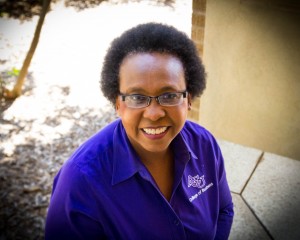
Dr. Orneita Burton
What is your work background?
Petrochemicals and oil and gas industry – Phillips Petroleum, Dow Chemical, Union Carbide, Mobil Oil/Chemical Division.
What do you teach at ACU?
Operations Management, courses in Information Systems (ERP, E-Commerce, Business Intelligence/Data Analysis), and Microeconomics online.
What committees/other duties do you have at ACU aside from teaching?
Faculty Senate; United by Faith and Racial Unity community efforts with Jerry Taylor and Doug Foster, SAP University Alliances faculty coordinator, recent Gen Ed Committee, support AIS (Association of Information Systems) students.
What drew you to teaching? Why did you want to work with students?
I tutored peers in math while in college and they would say I should be a teacher. I was an intervention tutor for students in elementary school when they struggled in math and reading during their early years. I would work with them to bring them up to grade level. All of my life, people would ask me why I was not a teacher. One day, I told someone that if I was given the opportunity to teach at a Christian university, I would change career paths. Dr. Jack Griggs, who was then Dean of the College of Business called a few months later. I could not turn down an answer from God.
What’s the best part of working with students?
In every student, there is a desire to learn. Many students have not tapped into this energy because of grade competition and standardized tests. I love the opportunity to reignite the desire to learn that God has placed in each of us. This is important, as why would we seek salvation without this motivation to learn about the God who created us? It compares to taking a multiple choice exam to pass the Salvation test. What do we learn about God?
Have you ever given up any big opportunities to keep working with students?
Definitely. Money is always a temptation in the oil and gas industry, even during market downturns. At times, I have been concerned about my children and their futures based on my choice. However, I believe I was called to be at ACU. I therefore allow God to unfold His daily purpose for our being here, both at ACU and in Abilene. I compare my walk to when Satan tempted Jesus with hunger (worry associated with need), seeking safety in peril and being offered the world and its riches. These are the same temptations each of us face – if we are willing to let God take the lead. It has been an adventure being here, and I have humbly found the answer to each of these choices: Jesus – plain and simple.
Outside of teaching, what passions and hobbies do you have?
I love to read, which, as I get older, motivates me to write. I believe I will one day write the story within that shapes the external and eternal “me.” I also have developed the worthwhile hobby of truly enjoying my marriage relationship. Marriage is a challenging experience in many ways. It takes an untraditional view of life to value relationships, particularly the marriage relationship. I enjoy the love of my life and have made loving others a daily “hobby.”
What is a good, early story about your teaching?
My mother always wanted to be a teacher. Contrarily, none of her children wanted to become teachers. Out of her 12 children, four are engineers, two are accountants, three are scientists of some type – invariably none became teachers by profession. Not until I was called to do so in the spring of 2000. Because of financial and family reasons, both my mother and father only finished the 9th grade. However, my mother always valued the teaching profession. When she was young, her best friend was a teacher. She decided to name me after her best friend. Therefore, I often think I was somehow “spirited” into the profession because God honored my mother’s dream.
Tell me about a project or accomplishment that you consider to be the most significant in your career.
Hard to say. We have been in Abilene almost 9 years. I think being here has created multiple project opportunities in community service. Abilene is a good place because the presence of God flows through so many people. Yet, for my family, being here has been the most difficult time in my life. Despite efforts by others for us to move on and move away, God has been our shepherd throughout the years; He has provided green pastures and laid a table before us time and time again.
Do you do any charity or non-profit work?
We created an ACU endowment in honor of my mother and father to fund scholarships for students; we provide two housing environments that promote human flourishing for people who may be homeless because of life’s circumstances. We also support the International Justice Mission (IJM) and a global academic community that works to integrate management, spirituality and religion as a way of doing business.
Who is your role model, and why?
My mother. She walked with God through the challenges of life, and was faithful until the end; then she went home to live in the mansion she never had while on earth – one built especially for her by Jesus. My mother loved geese. I think she is on a farm surrounded by geese and probably some generic form of duck.
Who was your most inspirational professor and why?
Dr. Charles Thatcher. He wrote the book I used at the University of Arkansas for foundations in Chemical Engineering as an undergrad. Through Dr. Thatcher, I was able to see what it looked like for someone to live and breathe what they taught. Inspirational, no doubt, and note-worthy. However, not yet sure if this is always a good thing.
If you could have a superpower, what would it be and why?
The power to reveal truth, create justice and show mercy all in the same breath, and ensure that everyone acted with pure and unselfish motives for the common good.
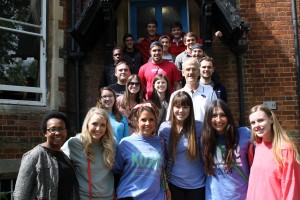
Dr. Burton and Dr. Pope teaching COBA students in Oxford.
What is something that students might be surprised to find out about you?
That I was raised by a practicing atheist. My father lived between agnostic beliefs and an atheistic walk – i.e., a defacto atheist. Was this all bad? Consider the following: a practicing atheist has no reason to lie or hide behind falsehood. Because of this, I was raised in a home where neither my mother nor father smoked, drank or engaged in anything traditionally regarded as wrong. My father in fact was very deliberate about what we as girls wore and how we presented ourselves as young women. He had a keen eye for falsehood and insisted that we avoid both the “vices” and “hypocrisies” of life. For me as a young person, this resulted in no real foundation and a true void that I ultimately had to choose how to fill. Despite our backgrounds, we all choose. Consider I Corinthians 3:10-15: “By the grace God has given me, I laid a foundation as a wise builder, and someone else is building on it. But each one should build with care. 11 For no one can lay any foundation other than the one already laid, which is Jesus Christ. 12 If anyone builds on this foundation using gold, silver, costly stones, wood, hay or straw, 13 their work will be shown for what it is, because the Day will bring it to light. It will be revealed with fire, and the fire will test the quality of each person’s work. 14 If what has been built survives, the builder will receive a reward. 15 If it is burned up, the builder will suffer loss but yet will be saved—even though only as one escaping through the flames. My advice to any student is to choose a solid foundation. Then, build a lifestyle that can sustain the trials of life, because the trials will surely come. When they do, don’t give up. You’ll be a better person on the other side.
What would you really want students and alums to know about you?
I believe that truth and right-living are found by searching with all your heart. Because of my family structure, I had to search for truth and learned the art of “research” and knowledge discovery early in life. Without a university experience, I would have missed experiencing the generic value of learning as a higher calling. Therefore, when I teach, I do so without political, personal or social agenda, and I work to show the natural design of God in all things. There are foundational truths that exist. Learning in any discipline should be all about coming to know truth. That is why I think teaching comes with great responsibility, and that is also why I think college is an important investment we should all make to provide this opportunity for everyone.
by M. C. Jennings | Sep 15, 2015 | Academics, Careers In..., COBA Faculty, College Decisions, Current Students, MBA, Research, School of Information Technology and Computing, Uncategorized
What is your educational background?
I majored in accounting at ACU, completed an MBA at UT with an emphasis in change management, and received my PhD in Information Systems from UT. Accounting was a great way to learn about business, the MBA broadened that experience and my interest in change management created a springboard into Information Systems.
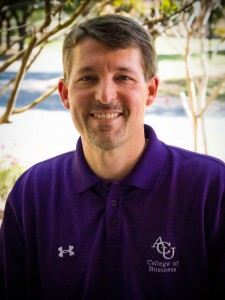
Dr. Brad Crisp
What is your work background?
My audit experience at Arthur Andersen was a fantastic way to learn about business. I spent a lot of time in nonprofit work. I worked for a brokerage firm, worked in real estate, for a tech start-up – which was actually one of the first internet providers, and on the consolidated financial statements for the U.S. government. It was a great way to learn about a lot of different organizations.
My experience in consulting allowed me to dive deeper into how organizations use both financial aspect and the systems aspect to execute tasks. I witnessed many interesting reactions to how technology is used. This is how I became interested in technology. It is just a piece of software, but people have different reactions to what it should do and how it should be used. This experience raised some interesting questions for me, ultimately leading me to pursue graduate work.
What do you teach at ACU?
I teach Systems Analysis and Design, which is a smaller project-based course focused on an organizational problem, where technology is part of the solution. I also teach Management Information Systems, which focuses on what business students need to know about technology and how information technology is used within the organization.
What committees/other duties do you have at ACU aside from teaching?
I am a sponsor of the ACU chapter of the Association of Information Systems, I am an advisory member of the student-run software company, Wildcat Software, and Director of the School of Information Technology & Computing, which is an academic unit within the College of Business Administration with majors in computer science, digital entertainment technology, information systems, and information technology. Most recently, I have been named Associate Dean for Graduate Business and charged with executing the launch of COBA’s new online MBA program.
What drew you to teaching?
I had a set of mentors that helped me begin thinking about academia not long after I graduated from college. Jack Griggs, former dean of COBA and one of my professors, would call once a year and ask about what I was going to do with my life. He encouraged me to think about being a professor. Also, when I was in Maryland, several of the folks that I met in church were professors. The interactions with them encouraged me to think about the benefits of being a professor, including teaching and research.
What’s the best part of working with students?
I am at ACU because I want to know students. During my first semester at ACU, I spent more time with students than during the five years I spent at Indiana. It wasn’t because I am a different person here, it was because the expectation was different. Students did not expect to to know their faculty and the reverse is true as well. ACU encourages those type of relationships and I enjoy spending time with students. I appreciate the opportunities to be involved in student organizations, go to chapel or lunch with students, have a chance to learn about what is important to them and be able to speak into their life in small ways.
Outside of teaching, what passions and hobbies do you have?
I spend a lot of time going to sports and other events for my sons. I like to play golf, sing on the praise team at Highland, and I serve on two nonprofit boards.
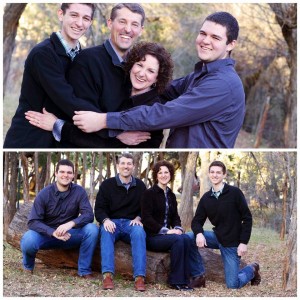
The Crisp Family
Do you have a good story from your early career in teaching?
When I was at Indiana, I was diagnosed with cancer and underwent surgery as part of the treatment. This was right before my third year of teaching. I remember how much that life event changed my perspective. During the process of recovery and going through radiation, being able to teach was a bright spot that provided a lot of joy during that time.
Tell me about a project or accomplishment that you consider to be the most significant
in your career.
I published some papers in journals and I’m very proud of those accomplishments. I don’t believe that most people understand how much time is involved in that process. There is a paper published a couple of years ago, that I worked on for about 15 years. This was a test of perseverance more than anything else, however, it was a great accomplishment.
I have also enjoyed consulting over the years. I wrote the business plan for one of the nonprofits that I serve and I have enjoyed seeing how far they have come.
I am proud of the recent ABET accreditation of the School of IT & Computing and in my work with curriculum revision, for the business core and now, in the creation of the MBA curriculum.
Who was your most inspirational professor and why?
Dr. Don Jackson, who taught economics, was a charismatic and enjoyable professor. He served as Deputy Director for Administration, Programs, and Resources at the National Security Agency (NSA) in the 1970’s and 1980’s. He often used the phrase, “I could tell you more, but I’d have to kill you.” Also as I mentioned before, Jack Griggs’ influence was definitely pivotal in my college experience and in my life.
If you could have a superpower, what would it be and why?
I would like to have the ability to slow down time.
What is something that students might be surprised to find out about you?
Right out of college, I was on a church planting team in Washington, D.C. and I also proposed to my wife on the summit of a mountain in Salzburg, Austria because her favorite movie is The Sound of Music.
What would you really want students and alums to know about you?
I would actually like for students to know that God creates each of us with purpose. I like to talk to students about how to find meaning in what you’re doing. For some, desire for meaning and faith may mean changing careers or going into ministry. For most of us, it means learning how to honor God in our daily lives. Having been involved in church planting, I believe it is easy to move across the country and say that you want to follow God. However, it is hard to actually live on a day-to-day basis in that way. More of following God, is in the process of making the small choices to serve him daily.
by M. C. Jennings | Sep 10, 2015 | Academics, Careers In..., COBA Events, COBA Faculty, College Decisions, Current Students, MBA, Mobile Learning, Placement stories, Research, Uncategorized
ACU will welcome the first class of its online MBA program this fall. I had the opportunity to sit down with Brad Crisp, COBA’s Associate Dean for Graduate Business, to learn more about the new program.
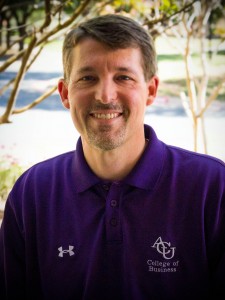
Why is ACU launching a Master of Business Administration program?
We offered a residential MBA for most of the 1980s and 90s, but it was difficult to attract the number of students that we wanted to serve in Abilene. With the launch of ACU Dallas, ACU is better equipped to serve graduate students through online programs. We now have the opportunity to reach a new market of graduate students who are established in their careers, yet wanting to be challenged and have the opportunity to grow professionally. The online MBA is the perfect vehicle for allowing them to continue their careers and attain their educational goals.
What is the focus of the curriculum?
The MBA curriculum is designed to equip students in four key areas:
- leadership skills that will enable them to lead in their career, but also in their homes, churches, and communities
- organizational innovation that prepares them to meet new opportunities
- decision-making that engages data available in today’s tech-driven workplace
- the ability to let faith and ethical principles guide their work
What role is COBA faculty playing in the creation of this program?
COBA faculty in Abilene designed the program and have played an important role in the development of the core courses that will be taken by all students. Additionally, some of the courses will be taught by our Abilene faculty, while other courses will be led by qualified faculty in Dallas and elsewhere.
How is graduate education different from undergraduate education?
Education ideally helps us think about theory and practice, that is, how we combine great ideas with implementation. One of the key differences in graduate education is that the adult learner has a greater amount of work experience to connect with the learning. Having an environment where students can bring their work experience into class discussions and on assignments is a key component of a professional program like the MBA. That is why I encourage students to work for a couple of years before making the transition to graduate education, because the knowledge gained in industry adds a great deal of depth to their graduate experience.
What excites you about the launch of this new program?
Most ACU faculty come to Abilene to teach the traditional undergraduate student, and we are excited to help students in that stage of their formation. Now we have decided that we aren’t stopping there. We have the chance to connect with adults in the next phase of their lives as they’ve grown in their careers, their communities, and their families. We have the opportunity to serve them in another important stage of their life, as they are learning where faith intersects with work and life.
For more information on ACU’s online MBA program, visit www.acu.edu/mba.
by M. C. Jennings | Sep 3, 2015 | Academics, COBA Faculty, College Decisions, Current Students, School of Information Technology and Computing, Uncategorized
Let us introduce you to Dr. Brent Reeves, Associate Professor of Management Science and Computer Science, in our first COBA spotlight.
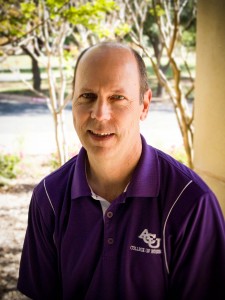
Dr. Brent Reeves
What is your educational background?
B.B.A., Computer Science, Abilene Christian University, 1980
M.A., Biblical and Related Studies, Abilene Christian University, 1982
M.S., Computer Science, University of Colorado at Boulder, 1991
Ph.D., Computer Science, University of Colorado at Boulder, 1993
I started as a double major in Bible and Accounting at ACU. I took Intermediate and Auditing before realizing I didn’t really like accounting. About that time, Dr. Charles Small joined ACU after finishing his Ph.D. at A&M. He said, “Switch majors – it’ll be great.” So, my junior year, 2 weeks into the semester, I dropped 18 hours and added 18 hours. Super stressful time. The schedule change made me reconsider the Bible major so I asked Dr. John T. Willis about the difference between an undergrad Bible degree and a graduate Bible degree. He answered, “When you finish the undergrad degree, you’ll be ready for the questions.” So he had me. My dad offered to pay tuition if I stayed at ACU, so I was fortunate to be able to study under Willis, Olbricht, Fair, Ferguson, etc. Those guys were great.
What is your work background?
My first programming job was part time at Dunigan Tool and Supply in Abilene. They had 10 oil field stores in 3 states. It was a fantastic opportunity. My boss, Dick Loveless, sent me on my first assignment with the admonition, “Don’t use any computer words. You’ll be talking to a guy who has done accounting for 25 years. He knows his stuff. He doesn’t know computers. Your job is to learn his stuff and translate it into a system.”
Next came ARCO Oil & Gas in Dallas for 4 years. We had 4 of IBM’s largest mainframes and a Cray-II supercomputer with 300 people in systems and programming. And… we made terrible systems. Every year, they got bigger and more expensive and…not any better. One day I caught an accountant saying, “All I wanted it to do was…” That got me thinking about User Interfaces – what would it mean to have a User Interface that let you do exactly what you wanted to do? And Knowledge-Based Systems – what would it mean if the system knew, understood what you wanted to do? Those two questions led me back to graduate school to study Artificial Intelligence and User Interface Design. In a random coincidence, I resigned the day the Challenger shuttle exploded.
After finishing graduate school in Computer Science in1993, teaching spots at the big “R” schools were, interestingly, not all that attractive. Two consulting opportunities arose – one with Software Research Associates, a company headquartered in Tokyo, and the other with ObjecTime, a Nortel-spinoff out of Ottawa. I got to work for ATT, Lucent, Motorola, and Ericsson and work in half a dozen countries. Challenging, but great.
What drew you to teaching and working with students?
The main draw was for the family lifestyle. You immerse your children in education – what it means to ask hard questions – what it means to work with people who study all kinds of different things they are passionate about. Enabling students who work hard to reach that “Aha” moment is great.
What is the best part of working with students?
Although the brilliant students are a delight, the best part is the students who just work hard. It is satisfying to see a student reach that point where it finally clicks.
Outside of teaching, what passions and hobbies do you have?
- Radio-control fixed wing and multi-rotors. Mostly scratch building. But now and then even flying. And by flying, I mean, crashing.
- I am fortunate to spend lots of time with my boys hiking around and enjoying creation.
- Terry Pope once humbly acknowledged that he was the best golfer in COBA. In that same spirit of humility, I am undoubtedly the best faculty player on ACU’s world famous intramural team, the Sunflowers of Death.
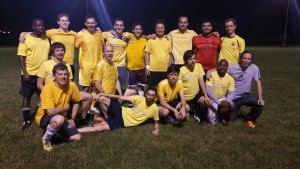
Sunflowers of Death
Do you have a good story from your early career in teaching?
The first day in Management Information Systems (45 students), as I was going through the syllabus, a student came in late and sat on the front row, pretty disruptively. Two minutes later a phone rings and he reaches into his backpack, looks at it, and answers it. “Hello? Yeah. Nah – some class. Whatever. Tonight? Sure.” By that time, I had just stopped talking. By now the whole class is listening in to this conversation. It just so happened that I had brought my grandfather’s hammer to class for an illustration about technology “tools”. So I walked over to the student and said, “Are you done?” “Yeah, why?” “May I please see your phone?” “Uhmmmmm, ok.” I took his phone, placed it on the floor, picked up the hammer and smashed the phone. Surprisingly, it didn’t just explode into bits, so I hit it again. Then I picked up the pieces, handed them to the student and said, “I’m sorry, son, but this class isn’t going to work out for you. You are excused.” He stammered around a bit and left.
The room was silent. Blank stares all around. Cell-phone policy explanation complete.
Two notes:
- I had said, “I’m sorry, son” because he actually was my son. It was Joshua, wearing a cap so students wouldn’t recognize him. When his phone rang, it was because I had speed dialed it without being noticed. When he answered it, he had reached into his backpack, turned off the ringing phone and grabbed a non-working old phone and pretended to have a conversation.
- The funniest thing of all was that right after I smashed the phone, Joshua was looking around at the students and a guy across from him was holding his own phone and frantically pressing ALL the buttons trying desperately to shut it OFF.
Who is your role model and why?
Mom. Growing up in a time when the public voices we heard were mostly male, she found a way to be constructive. Tireless worker, always teaching, volunteering, organizing.
Dad. Church of Christ preacher who decided to do missionary work in a foreign country. He was extremely well-read. Preached for German-and English-speaking congregations every Sunday for 12 years in Wiesbaden.
Dr. John T. Willis. In a graduate class “Advanced Introduction to the Old Testament”, each student gave a presentation on the book they had been assigned. When the Isaiah student started with the same-old same-old, Dr. Willis kindly interrupted, “I see your references don’t include Blinkendorfer. When you’ve had a chance to do a little bit more research, have another go at it.” Boom. I learned there are real issues in the biblical text and we must deal with them. Before you quote scripture, do your homework.
Who was your most inspirational professor and why?
Undergrad: Dwight Caughfield. Disciplined, studied, calm, clear approach to topics such as new programming languages.
Graduate: John T. Willis. He modeled how to treat scripture with respect, to do your homework – not just quote a 2,000 year old saying because you like its current translation.
If you could have a superpower, what would it be and why?
If you rule out the “clearly ridiculous” powers, I choose… Magneto. Shaping metal would be awesome. Well, either Magneto or the power to type faster. Either one.
What is something that students might be surprised to find out about you?
- I’ve gotten to stand on Lost Arrow Spire twice. If you ignore the 3,500 foot drop, it has a nice view.
- I once learned to memorize a deck of cards so you could shuffle it, read the cards, and I could recite them forwards, backwards and name the 17th card, etc. So why are names so hard to remember?
What would you really want students and alums to know about you?
- We have a great set of profs here and after 14 years at ACU, I am still continuing to learn to appreciate how much work that takes. It takes much good will and many contributions to make ACU go.
- I wonder how to live a life that deals intentionally with the challenge to be “Grace and Truth”. What if that is the test? Today, this day, I am not so good at that.
by M. C. Jennings | Aug 3, 2015 | Academics, COBA Faculty, Poverty and Development, Research, Uncategorized
During the month of May, Dr. Monty Lynn worked as a visiting researcher at World Vision in Washington, DC. World Vision is a Christian humanitarian organization dedicated to working with children, families, and their communities worldwide to reach their full potential by tackling the causes of poverty and injustice.
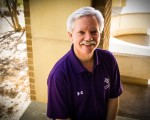
Dr. Monty Lynn, Professor of Management
Working with Dan Norell, a Senior Technical Advisor in Economic Development, and with a team of international professionals from World Vision, CARE, and Save the Children, Dr. Lynn participated in a research project using market-based approaches to enhance food security in developing countries.

While in Washington, Dr. Lynn met with representatives from several organizations including Bread for the World, ACDI/VOCA, USAID, and others. “Working with World Vision opened my eyes to the complexities of development programming. From securing funding to partnering with regional field offices to designing and coordinating sustainable food programs and measuring their impact—this is challenging work.” Dr. Lynn said that “Meeting with dedicated professionals in Washington and in early-morning teleconferences with professionals from Australia to Zimbabwe, I was impressed with the knowledge, passion, and skill of the World Vision staff. It was a blessing to be with them, even for a short period of time.”
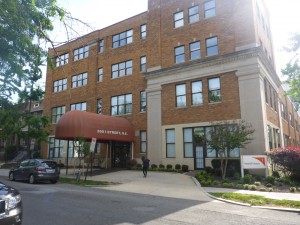
The Washington, DC offices of World Vision.
While serving as a visiting researcher, Dr. Lynn was invited to give a staff development presentation for the Washington office of World Vision on workplace spirituality. He hopes to visit at least one of the sites included in the research while on faculty renewal leave in fall 2015. “I’m thankful to the ACU College of Business Administration and to World Vision, and especially to Dan Norell, for an opportunity to learn and work alongside some of the best in the business.”
Join us on this blog as we follow and share Dr. Lynn’s work this fall.
by M. C. Jennings | Jun 22, 2015 | Academics, COBA Faculty, Current Students, Uncategorized
We’re back to the blog after a brief hiatus. It’s time to check back in on our COBA students and their adventures!
COBA in France: June 11th by Reese Herring and Zack Horton
Today was probably the busiest day we’ve had thus far on our trip. At 4:30am this morning the coach picked us up at our houses in Oxford and took us to the Gatwick airport in London where we took a 45 minute flight across the English Chanel to Paris, France.
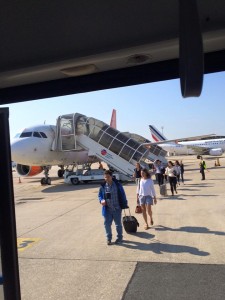
When we arrived in Paris we got on a coach and traveled about an hour and a half outside the city to a town called Amiens.
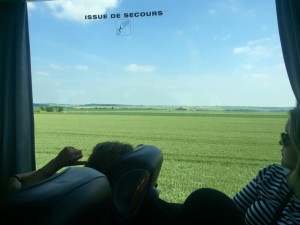
We immediately drove to Amiens, a few hours outside the city, and visited a tech company called Appleton who is owned by Emerson Electric.
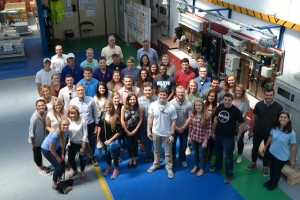
After lunch they gave us a short presentation over the heat and extreme weather resistant electrical products that they provide for those customers. Following the presentation we took a tour of their factory where they were manufacturing all of their products.
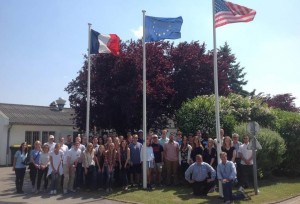
After we left their factory, we rode the coach into town and toured the Notre Dame cathedral of Amiens, which is twice the size of the Notre Dame cathedral in Paris, to put it in perspective. The cathedral was built in the 13th century.

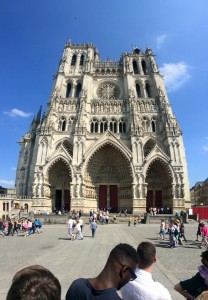
At about 6 o’clock we left Amiens and took a 3 hour coach ride to Paris. When we arrived in Paris we checked into the MIJE Hostel, ate dinner and walked around Paris for about an hour. It was a big day packed full of activities and driving all over France!
COBA in Paris: June 12th by Ellen Johnson
June 12 I was the historian of the day! We had the opportunity to explore the city of Paris on our own before a bike tour. We rode about 8 miles and were able to see awesome historical sights. In the morning we got up and went to a French bakery for breakfast, walked to the Louvre and ended at the Eiffel Tower.
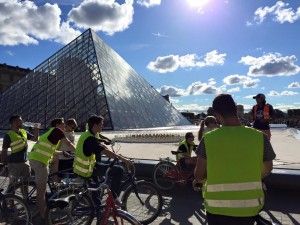
It was so much fun getting to see different landmarks that I have heard about since I was little but had never visited. It was crazy trying to communicate with the people of Paris via hand signals and the broken French that our group knows. It was also hard to differentiate between cultures because they looked like us but it was weird to think that they could not understand us at all. On the bike tour, we were able to see more of the city where we hadn’t walked and learned a little history about everything we saw.

COBA in Paris: June 13th by Chelsea Johnson
Saturday, June 13th, we had free time to explore the wonderful city of Paris! I woke up and decided I wanted crepes for breakfast. I then proceeded to city Ladúree to get a whole box of macaroons.

Then we took a cab to the catacombs, but the line was wrapped all around the corner of the block so we were unable to view them. Instead, we decided to have pizza with chili oil (my new favorite pizza accessory).

Next, we headed back to the hostel and then took a 4 hour bus ride to Normandy. Once in Normandy, we ate at a cute little seafood restaurant right next to the dock and then hiked up the mountain to explore, enjoy the beauty of the city, and watched the sunset. The end!
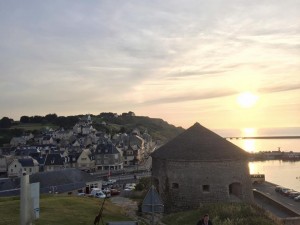
COBA in France: June 14th by Chris Kirklin
Today was our last day in France.
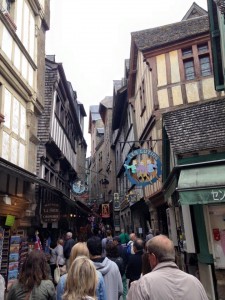
We began the morning with a nice breakfast at our hotel followed by a bus ride to Mont St. Michel. Mont St. Michel is an island commune, which was built before the year one thousand.

Over the centuries since it was originally built, there have been many additions to make Mont St. Michel what it is today. Twice a month, the tide engulfs the area around it, making Mont St. Michel one of the most beautiful places in all of France. Unfortunately today, the tides did not reach the castle but from the pictures and postcards we saw, it looked to be a beautiful sight.
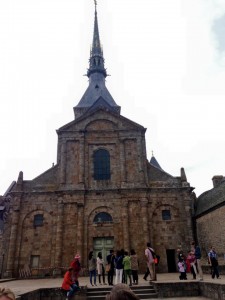
The style and architecture was exquisite and I think it reminded everyone of Hogwarts.
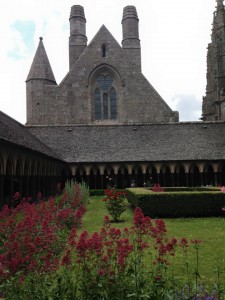
After the tour we set off to Dinard Airport to catch our flight back to London and finished off the day with a bus ride back to Canterbury Road!
























